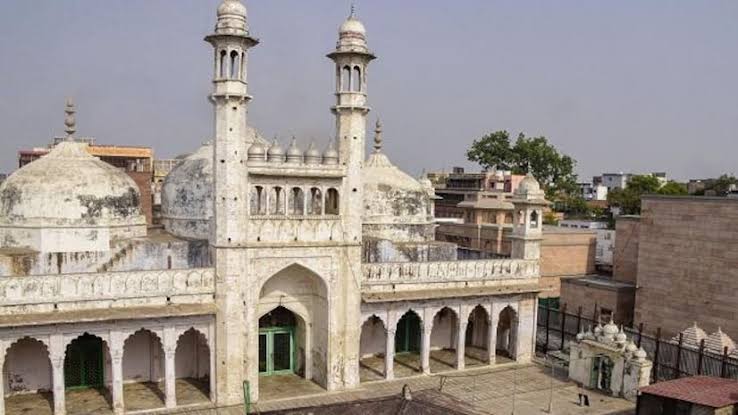
The Archaeological Survey of India (ASI) has said that a historic temple existed at the site of Gyanvapi mosque complex in Varanasi, Uttar Pradesh.
Jain, during a press conference, conveyed that the ASI report indicates the presence of a substantial pre-existing Hindu temple.
The ASI report, incorporating a Ground Penetrating Radar (GPR) survey, raises questions about historical layers at the site.
Jain suggests that the current mosque structure appears to have been constructed atop a pre-existing one, with modifications involving the reuse of pillars and plaster, along with attempts to alter carvings on the pillars, as per the ASI findings.
Jain further asserted that inscriptions in Devanagari, Telugu, Kannada, and other scripts, belonging to the ancient Hindu temple, were uncovered during the survey.
The report recorded a total of 34 inscriptions, with 32 stamped pages taken.
These revelations follow a Varanasi court’s ruling that the ASI survey report must be shared with both Hindu and Muslim parties.
Last year, the ASI conducted a scientific survey of the Gyanvapi premises, responding to assertions that the mosque was built over a Hindu temple’s remnants.
The court-ordered survey underscores the ongoing complexity surrounding the historical and religious context of the Gyanvapi mosque complex.
What’s the controversy
The Gyanvapi Mosque in Varanasi, India, erected in 1669 during Aurangzeb’s Mughal rule, has become a contentious historical site, triggering prolonged disputes between Hindus and Muslims. Legal petitions filed by Hindu groups in 1991 claim that the mosque stands on the ruins of a Hindu temple, while the Muslim community emphasizes its historical legitimacy for Islamic worship.
Tensions escalated in 2021, leading to calls for archaeological surveys and court-ordered video inspections.
These efforts revealed objects claimed by Hindus as evidence of a former temple, reigniting debates on religious freedom, historical claims, and the interpretation of the Places of Worship (Special Provisions) Act of 1991. The legal battles involve intricate historical narratives and religious sentiments, with the Indian judiciary playing a crucial role in balancing competing claims.
The Gyanvapi Mosque holds significance in Varanasi, Uttar Pradesh, a city deeply rooted in India’s ancient and cultural heritage.
Varanasi, also known as Benares or Kashi, stands as one of the world’s oldest continuously inhabited cities and a central pilgrimage spot for Hindus.
The mosque, situated in Varanasi’s heart, reflects the diverse religious history and architectural heritage of the area.
The management of the Gyanvapi Mosque is overseen by the Anjuman Intezamia Masjid committee, comprising members from the Muslim community.
Responsible for maintenance and management, the committee preserves the mosque’s historical significance while meeting the spiritual needs of visitors and worshippers.
Beyond physical upkeep, they ensure the mosque remains a peaceful space for prayer and reflection amidst the ongoing controversy.
In a parallel context, the Babri Masjid controversy, involving the construction of a Ram temple, saw the Supreme Court ruling in favor of the temple’s construction.
This legal decision, similar to the Gyanvapi Mosque dispute, has further highlighted the complex interplay between religious sentiments, historical claims, and the legal framework in shaping India’s cultural and religious landscape.
